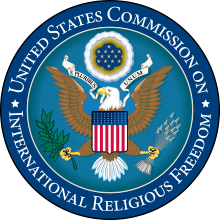


. Applauds U.S. Senate Bipartisan Efforts to Create the Senate Human Rights Commission
Washington, DC – The United States Commission on International Religious Freedom (USCIRF) today marks the 10th anniversary of the assassination of Shahbaz Bhatti, Pakistan’s former Federal Minister of Minorities Affairs and the first Christian parliamentarian in Pakistan’s government. USCIRF renews its call for the Pakistani government to bring to justice his killers and end the culture of violence and impunity that the blasphemy law fuels.
“Ten years after his assassination, we continue to gain strength from Shahbaz Bhatti’s legacy,” said USCIRF Chair Gayle Manchin. “He defended a vision of a diverse, multicultural, and multireligious society. He opposed Pakistan’s blasphemy laws as a stark betrayal of that vision. And he paid the ultimate price for his courage. Mr. Bhatti’s death was not in vain and his legacy will continue to inspire and encourage us to keep pressing on until his vision in realized.”
Click here to watch Chair Manchin’s video remarks
In September 2009, USCIRF facilitated a visit to Washington, DC to introduce him to policymakers at the White House, the State Department, and Congress. During that visit, the Commission presented Mr. Bhatti with an award for his courageous work defending the rights of all Pakistanis, especially religious minorities.
Bhatti was assassinated by Tehrik-i-Taliban, the Pakistani Taliban, on March 2, 2011 outside his mother’s home in Islamabad. His murder followed the assassination of Salman Taseer, the Muslim governor of Punjab province, who was also killed for his opposition to Pakistan’s blasphemy law. Together, they championed the case of Asia Bibi, a Christian mother of five who spent nearly a decade in prison after being sentenced to death for blasphemy. Bibi is free today in Canada, in part, because of their shared legacies.
In the years since Bhatti’s death, violent extremism has increased in Pakistan, and religious minorities remain a target, particularly Shi’a and Ahmadi Muslims, Hindus, Christians, and Sikhs.
“Pakistan’s blasphemy laws are among the worst in the world, and they are vigorously enforced. Today, many innocent people are on death row for their faith alone,” said USCIRF Commissioner Johnnie Moore. “Prime Minister Imran Khan and other Pakistani officials should stand up to the extremists in the country, now. If something doesn’t change, USCIRF believes targeted sanctions could very well be on the horizon.”
In its 2020 Annual Report, USCIRF recommended that the U.S. Department of State continue to designate Pakistan as a Country of Particular Concern, a recommendation USCIRF has made since 2002 due to Pakistan’s systematic, ongoing, and egregious violations of freedom of religion or belief.
In December 2020, USCIRF published a report on Violating Rights: Enforcing the World’s Blasphemy Laws, which examines the enforcement of blasphemy laws worldwide. This report found that the country with the most cases of state enforced blasphemy laws was Pakistan, with 184 cases identified between 2014-2018. In June, USCIRF released a Policy Update on Pakistan that outlines the path for reforming and eventually repealing its blasphemy law.
Meanwhile, USCIRF has in a statement, also applauded the reintroduction of a resolution to establish the Senate Human Rights Commission (S.Res.80) on the floor of the United States Senate.
“USCIRF is grateful that the United States Senate is prioritizing international human rights through the proposed creation of the Senate Human Rights Commission,” said USCIRF Chair Gayle Manchin. “The Senate Commission would convene experts on various human rights situations taking place around the world and discuss solutions to very difficult problems, and it would serve as an important reminder that the U.S. is committed to individual universal freedoms as a vital part of its foreign policy and engagement with the world. We look forward to the establishment of the Senate Commission and seeing its contribution to international religious freedom as it addresses the ongoing persecution of faith communities around the world.”
If agreed to in the Senate, the Commission will serve as a forum for bipartisan discussion of international human rights issues, including international religious freedom. It will promote internationally recognized human rights as enshrined in the Universal Declaration of Human Rights and address international human rights violations through regular briefings and hearings.
“International religious freedom is one of many global human rights issues that must remain a bipartisan commitment in Congress,” said USCIRF Vice Chair Tony Perkins. “The Senate Human Rights Commission would be an important initiative for institutionalizing the kind of public discourse needed to highlight and find solutions for the most egregious situations facing our times, such as the Uyghurs in China, the Rohingya in Burma, and Christians in Nigeria. We applaud the leadership of Senators Coons and Tillis and urge the Senate to adopt this resolution and establish the Commission.”
The resolution to establish the Senate Human Rights Commission is modeled after the Tom Lantos Human Rights Commission in the U.S. House of Representatives, and is led by Senator Chris Coons (D-DE) and Senator Thom Tillis (R-NC).

